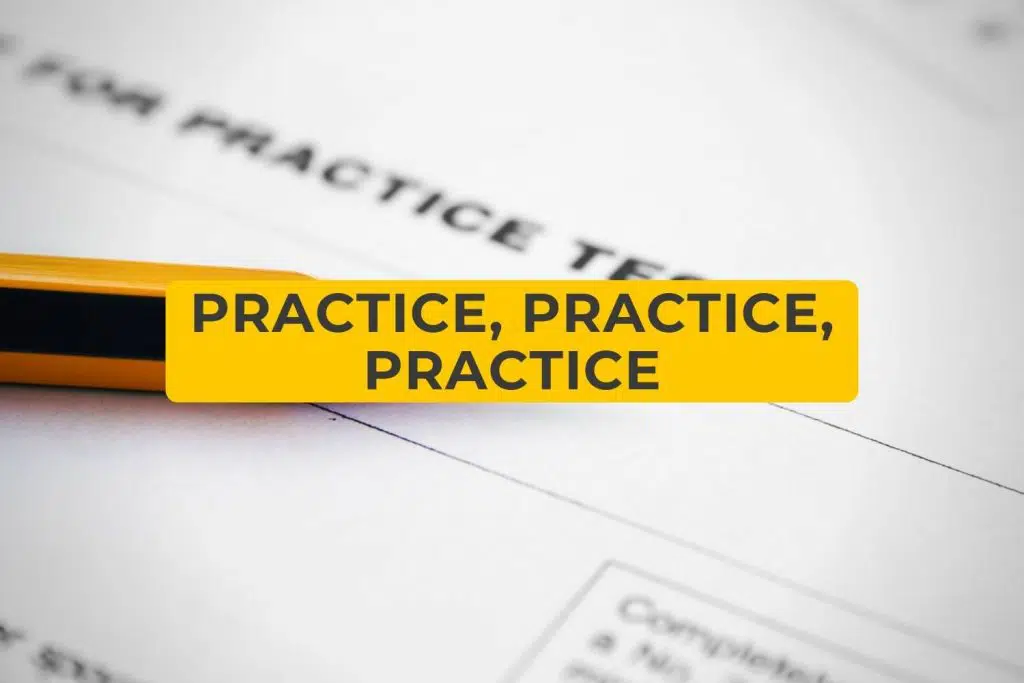If you need to take the ACT for college or university admissions, you want a great score that puts you in the top percentile. Not happy with your ACT score? Find out how to improve your ACT score by 10 points with these tips, tools, and tricks.
The ACT (American College Testing) is an aptitude test used by many institutes of higher education as a benchmark in measuring students’ abilities for admissions. Do you need to take the ACT to get into college or university? Then you undoubtedly want to get the best score possible.
Have you already taken the ACT or an ACT practice test and aren’t happy with your score? Don’t stress. It’s possible to improve. It simply takes some time, effort, and preparation. This guide explains how to improve your ACT score by 10 points.
10 Tips for How to Improve Your ACT Score by 10 Points

The ACT covers four primary subject areas, math, reading, English, and science. Each area is given a scaled score from 1 to 36 (36 being the best). These area-specific scores add up to get an average composite score, ranging from 1 to 36.
Students’ scores are ranked according to percentiles, comparing them to the competition. Since the test-takers and their scores change every year, the percentiles change too. For example, in 2016, if you scored a 36 total, this put you in the 99th percentile, meaning you scored better than 99% of test-takers. However, achieving a 36 total in 2020 puts you in the 100th percentile.
The better you score, the better your percentile—and the more impressive your ACT results will be to college and university admissions officers. Read on to find out how to boost your score by as much as ten points.
1. Start Studying Early
Don’t save ACT studying for the last minute. You want to leave plenty of time to master this test’s format, content, and unique style. It isn’t like the usual exams you might take in school. On top of that, the ACT is a high-pressure situation with high stakes.
Many people find that the stress associated with the test—since it can influence college admissions decisions—adds to the difficulty. In short, you want to be as prepared as possible so that this added anxiety doesn’t get to you. As soon as you know your next test date, start studying.
2. Use Your Old Score Report for Guidance

If you aren’t happy with your last ACT result, you might want to throw it in the garbage. Stop! Your score report contains valuable information that can help you do better on your next test. Make sure you understand how to read your score report and hang on to it.
Check out the detailed results section of your score report and identify the lowest-scoring section (out of the four: math, reading, English, and science). This lets you know where you should focus your energy in the future.
For example, let’s say the science section of the test was your lowest scoring area, while math was your second-lowest scoring area. If you bring up each of those subsection scores by five points, you’ll be able to achieve the ten-point improvement you’re striving for. Focus your energy accordingly.
3. Create a Study Plan
In general, it’s best to leave yourself at least six weeks of space between ACTs. Rushing to retake the test is unlikely to give you the plus-ten-points result you are hoping for. Less than six weeks isn’t enough time to achieve a significant change.
Once you have your next ACT date booked, map out a study plan. Depending on how well you score in each subsection, accommodate a suitable amount of time to study and improve.
For example, if you want to focus on math and science and have seven weeks to prepare, you might concentrate three weeks on math and three weeks on science—and give yourself one extra week to do practice tests. This ensures you aren’t left rushed right before the test.
4. Focus on Improving Your Time Management

The ACT is a timed test. It should thus come as no surprise that one of the most challenging elements is simply finishing each section on time. Part of your ACT prep should therefore include time management. It is, thankfully, relatively straightforward to improve your times.
Keep a stopwatch by your side whenever you complete a practice test (or use your phone as a timer). You can check your time regularly to see how well you’re doing in terms of keeping up.
Further, you can start practicing skills that will help you improve your time management on the actual test day. For example, it’s often best to skip tough questions that will take up loads of time. You can always come back to them later. Being able to identify time-wasters is critical.
5. Memorize Essential Rules and Formulas
Part of improving your time management means simply learning how to do things more quickly. There are a few steps you can take to improve your time. For the math and science sections, it’s often helpful to memorize specific basic formulas, for example.
This way, you don’t have to waste time recalling a formula and instead jump directly into problem-solving. Useful math formulas to remember for the ACT include the area of triangles, the slope-intercept formula, the quadratic formula, and trigonometry functions.
6. Improve Your Reading Speed

Even if your reading score was acceptable, improving your reading speed can also be a critical component to tremendous ACT success. Why? The test itself is a written format, and you have to read every question and comprehend it fully to provide an accurate answer.
Slow reading can leave you behind time-wise in any section, be it math or science. There are many ways you can improve your reading, such as learning how to scan a text. This YouTube video provides some great tips on improving your reading speed.
7. Invest in ACT Test Prep Materials
If you’re wondering how to improve your ACT score by 10 points, you’re probably willing to invest some money into the problem. ACT materials are one worthy investment. You can get books, practice tests, and guided tutorials to help you improve.
Many of these materials are readily available on Amazon. Since the ACT evolves annually, make sure to get a recent study guide that corresponds to the year you plan to take the test. You don’t want to work with outdated materials that are no longer relevant.
If you aren’t making the progress you want with ACT prep materials alone, you might also consider getting a tutor. A professional can structure your ACT study plan and guide you through lessons. They can also provide valuable moral support.
8. Practice, Practice, Practice

Don’t just take one practice test before your next ACT. Take as many as you can! Practice tests allow you to hone your new skills and get more comfortable with the general test format. You can also learn new strategies, like figuring out when to skip a question.
After every test, review your total score and your section subscores. Take the time to look at questions that confused you to pinpoint what the issue was. For example, was there a formula you could have known that would have helped? Learning it now may help you in the future.
9. Find Ways to Tackle Your Nerves
After all that preparation, you don’t want to end up doing poorly on your ACT because nerves got to you. This is a high-pressure situation, so it’s understandable to be anxious. However, it’s up to you to figure out how to manage that anxiety to not interfere with your test.
There are many ways to help minimize test anxiety, from self-encouragement to showing up to the testing site early. You can also try on-the-spot exercises to soothe yourself, such as deep breathing or meditation. Take a moment to calm your mind before you start.
10. Follow a Strict Game Plan Before Your Next Test

The night before your ACT, try to relax. Eat a healthy dinner, clear your schedule, and set yourself an early bedtime. You want to be well-rested and alert on test day. If you have trouble falling asleep due to nerves, try taking a warm bath or listening to some relaxing music.
Set out all the supplies you’ll need for the ACT the night before, such as pencils or calculators. You can also save time by setting out the clothes you’re going to wear on test day. This will save you stress and hassle the following day, ensuring you have no distractions.
Finally, eat a healthy breakfast before you head to the test. You may not be hungry if you’re feeling nervous, but you will need food for energy and keep you focused. When you’re trying to improve your ACT score, the last thing you want is to be distracted by a rumbling stomach.
The Final Word on How to Improve Your ACT Score
Your ACT score won’t magically improve overnight without any effort from your side. It’s up to you to identify problem areas and make changes accordingly. With the right study plan and adequate preparation, you can improve your score.

